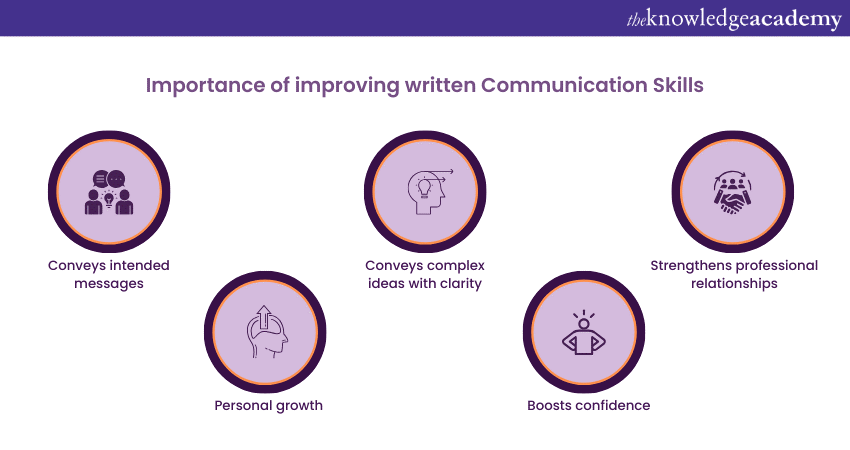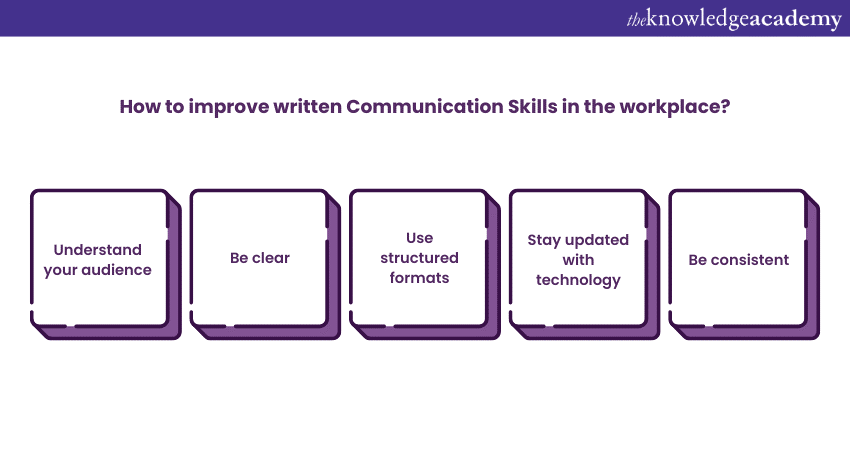We may not have the course you’re looking for. If you enquire or give us a call on +30 2111995372 and speak to our training experts, we may still be able to help with your training requirements.
Training Outcomes Within Your Budget!
We ensure quality, budget-alignment, and timely delivery by our expert instructors.

Communication has always been one of the critical factors to carry out everyday activities and businesses. As technological advancements took place, there was a shift in how companies and individuals communicate with each other, that is, from verbal to written. Among many other different forms of Communication, having a solid grasp of your Written Communication Skills is extremely important. If you learn How to Improve Written Communication Skills, then you can be efficient in both your personal and professional life.
According to Project.co, more than 62% of businesses use email as their primary form of communication to interact with customers and clients. When you are writing an email, drafting a report, or crafting a social media post, your writing serves as a first impression. In this blog, you will learn How to Improve Your Written Communication Skills to increase efficiency in both personal and professional settings.
Table of Contents
1) Importance of improving Written Communication Skills
2) How do you improve Written Communication Skills in general?
3) How can you improve Written Communication Skills in the workplace?
4) Enhancing Written Communication Skills in English
5) Conclusion
Importance of improving Written Communication Skills
Written Communication Skills are essential in every field and almost every aspect of daily life. In this section, you are going to learn why enhancing one's Written Communication Skills is crucial:

1) Professional credibility: In the professional sphere, the quality of your Written Communication often dictates the impression you make. Well-composed emails, reports, or proposals not only convey the intended message but also reflect a sense of dedication, attention to detail, and competence. Sloppy writing with grammatical errors or unclear directives, on the other hand, can detract from one’s reputation and perceived capability.
2) Practical expression of ideas: Written Communication can be reviewed, refined, and edited until the communicator feels the message is just right. A honed skill in writing ensures that complex ideas are conveyed with clarity, eliminating ambiguities that could lead to misunderstandings.
3) Strengthened professional relationships: Clear and effective Written Communication reduces the chances of misinterpretation, which is a common issue in the workplace. When teams, partners, or collaborators understand directives and feedback clearly, it creates an environment of trust and mutual respect. Improved Written Communication can be a catalyst in building professional relationships.
4) Global outreach: Businesses and individuals frequently interact with peers from different parts of the world. Written Communication, especially in a widely recognised language like English, bridges the geographical divide. Strong writing skills ensure that even in the absence of face-to-face interactions, collaborations happen seamlessly, and ideas transcend borders.
5) Empowerment in the digital age: The rise of social media platforms, blogs, and online forums has given a voice to millions. What distinguishes one voice from another in this vast sea of digital content is often the quality of Written Communication. Those who articulate their thoughts coherently and persuasively find themselves better heard, their ideas gaining more traction.
6) Personal growth and reflection: Beyond the professional domain, writing is a tool for introspection. Journaling, a practice embraced by many, aids in processing emotions, experiences, and ideas. Improved written skills make this process more rewarding, enabling more precise thought structures and a deeper understanding of oneself.
7) Learning and knowledge retention: Documenting, a significant component of learning, requires adept Written Communication. Whether it's making notes during a lecture, writing essays, or composing research papers, the ability to articulate thoughts on paper enhances comprehension and retention. Moreover, well-written pieces serve as valuable resources for revision and future reference.
8) Boost in confidence: With enhanced writing skills, the hesitation to put one's ideas forward, be it in the form of emails, reports, or even creative expressions, diminishes. This increase in self-assurance can lead people to tackle challenges they previously avoided.
Unlock effective communication today with our Communication Skills Training!
How do you improve Written Communication Skills in general?
Written Communication Skills are about more than just stringing words together. It involves crafting meaningful messages that resonate with the reader. Here's how one can elevate their Written Communication Skills:
1) Regular practice: The more you write, the better you get. It's essential to make writing a daily habit, be it through maintaining a journal, drafting articles, or even indulging in creative writing. This consistent practice helps in refining language skills and finding one's unique voice.
2) Diverse reading: Exposure to various writing styles and genres, such as novels, newspapers, academic journals, and blogs, can enrich vocabulary, help you grasp effective writing techniques, and understand language nuances.
3) Seek constructive feedback: Writing, while a personal endeavour, can benefit immensely from external perspectives. Sharing your work with peers, mentors, or writing groups can provide invaluable feedback. Constructive criticism highlights areas of improvement, offers diverse viewpoints and sometimes reveals overlooked mistakes.
4) Edit and revise: Good writing often involves reworking, editing, and refining. This process helps in eliminating redundancy, correcting errors, and enhancing the flow of thoughts. Tools like Grammarly or Hemingway Editor can assist in polishing your work.
5) Expand vocabulary: A rich language allows for more precise expression. However, expanding vocabulary is about more than using difficult words; it is understanding the subtle differences between similar terms and employing them aptly. Tools like thesauruses or apps like 'Word of the Day' can aid in this endeavour.
6) Master the basics: Before delving into sophisticated writing techniques, it's imperative to have a solid grasp of grammar, punctuation, and basic writing conventions. These foundational elements ensure clarity and coherence in Written Communication.
7) Structured writing: Organised content enhances readability. It's essential to structure your writing, beginning with a clear introduction, followed by the main content, and concluding with a summary or final thoughts. Using bullet points, subheadings, and short paragraphs can make the content more scannable and digestible.
8) Empathy in writing: Understanding the reader's perspective is a hallmark of effective Communication. When writing, consider the reader's knowledge level, cultural context, and expectations. This empathetic approach ensures that the message is tailored to the audience, increasing its impact.
9) Limit distractions: In our multi-tasking era, distractions can hinder the writing process. Designate specific times for writing, free from interruptions. Applications that block distracting websites or promote the 'Pomodoro Technique' can help maintain focus.
10) Continuous learning: Engaging in writing workshops, online courses, or writer’s retreats can offer fresh perspectives, introduce new techniques, and nurture growth as a writer.
11) Stay curious: Curiosity fuels writing. Asking questions, exploring diverse topics, and diving deep into subjects of interest can infuse passion into your writing, making it more engaging and authentic.

How can you improve Written Communication Skills in the workplace?
Honing one’s Written Communication Skills is vital for success in the professional realm. Here's how to improve Written Communication Skills in the workplace:

1) Understand your audience: Every piece of Communication, whether an email, report, or memo, has an intended audience. Recognising this audience, understanding their expectations, and tailoring your message to suit their needs is crucial. A message meant for a colleague may differ significantly from one intended for a stakeholder or client.
2) Clarity is key: Your Communication should be straightforward, concise, and devoid of jargon, even if it's industry-specific and widely understood. Clear Communication minimises the risk of misinterpretation.
3) Use structured formats: Especially in reports or longer emails, a structure can significantly enhance comprehensibility. Using bullet points, numbered lists, headings, and subheadings breaks the content into digestible chunks, making it easier for the reader to grasp key points.
4) Active over passive: Using active voice often results in more precise, more direct statements. For example, "The team completed the project" (active) is more straightforward than "The project was completed by the team" (passive).
5) Proofreading: Before hitting the send button or printing a document, always proofread. Spelling mistakes, grammatical errors, or typos can detract from your message and appear unprofessional. Tools like Grammarly can help, but a personal review is indispensable.
6) Feedback culture: Cultivate a culture where team members can give and receive feedback on their Communication. Constructive feedback can shed light on areas of improvement, ensuring continual growth.
7) Stay updated with technology: Leverage technology to improve your writing. There are numerous tools and apps, like Hemingway Editor or Microsoft Editor, which can refine your writing by identifying passive voice, adverb overuse, or complex sentences.
8) Professional development: Attend workshops or seminars focused on business writing or Written Communication. These sessions can offer insights into modern communication standards, expectations, and best practices.
9) Tone matters: Written Communication doesn't have the advantage of vocal inflexions, making it essential to ensure the manner is appropriate. Depending on the content and recipient, adapt your tone to be formal, friendly, authoritative, or inquisitive. Always be respectful.
10) Consistency: Whether it's the format of reports, the tone of emails, or the structure of memos, maintaining consistency in Written Communication sets a professional standard. Consider creating templates or guidelines to ensure uniformity in team Communications.
11) Practice empathy: Understand that only some people in the workplace may have the same cultural background or language proficiency. Write with heart, considering the diverse backgrounds of your readers. This inclusivity can prevent misunderstandings and foster better workplace relationships.
12) Continual learning: Languages evolve, and so do workplace dynamics. Stay updated with new terminologies, industry jargon, or evolving language norms. Continuous learning ensures your Communication remains relevant and effective.
Master the art of impactful conversations with our course on Effective Communication Skills Training
Enhancing Written Communication Skills in English
For non-native speakers and even for some native speakers, refining Written Communication Skills in English can open doors to broader audiences, clearer expression, and heightened opportunities. Here’s how to improve Written Communication Skills in English:
1) Invest your time into reading: Immerse yourself in diverse English literature. From classics to contemporary novels, newspapers to academic journals, expose yourself to varied styles and tones. This not only helps in vocabulary acquisition but also familiarises you with different constructs of the language.
2) Strong hold on grammar: English grammar can be intricate. Tools like Grammarly, online courses, and grammar workbooks can assist in mastering tenses, prepositions, and other grammar intricacies. Regular practice and feedback are essential.
3) Engage in writing exercises: Consider dedicated writing exercises, like summarising articles, penning short stories, or even writing and rewriting paragraphs in different tones. This iterative process solidifies learning and improves adaptability in writing.
4) Join English writing forums: Platforms like English Stack Exchange or various writing subreddits offer a space for writers to seek feedback, ask questions, and engage with a community of English writers, both native and non-native.
5) Expand vocabulary: Utilise 'Word of the Day' applications or flashcards to incorporate new words into your vocabulary. Remember, it's essential to use new words in context to understand their nuances and appropriate usage.
6) Write regularly: Much like any skill, consistency is key. Maintain a journal, start a blog, or write articles on platforms like Medium. The more you write, the more comfortable and skilled you become.
7) Seek constructive criticism: Share your writings with peers, teachers, or mentors proficient in English. Their feedback can offer invaluable insights and pinpoint areas for improvement.
8) Engage in English writing courses: Numerous online platforms offer courses tailored to English writing. These structured modules provide foundational knowledge, techniques, and peer interactions.
9) Understand cultural nuances: English, though universal, carries regional flavours, idioms, and expressions. Whether it's American, British, Australian, or Indian English, being aware of these differences ensures that your writing resonates with your intended audience.
10) Practice translation: For non-native speakers, translating thoughts from their mother tongue to English can be beneficial. It forces the brain to think critically about language constructs, fostering a deeper understanding.
11) Listen and observe: Written Communication Skills in English can also be honed by listening. Engage with English podcasts, movies, or talk shows. It can be helpful to pay attention to the structure of sentences and the way ideas are expressed, as this can offer valuable insights.
12) Stay updated: As with all languages, English evolves. New words get added, while some become archaic. Regular engagement with contemporary writings, news, or academic literature ensures that your knowledge remains current.
Enhance your English Grammar with our English Grammar Masterclass!
Conclusion
In this blog, you learned How to Improve Your Written Communication Skills for your workplace as well as in your personal life. Maintaining standards and good communication clears all misunderstandings and creates impactful messages. By investing in these skills, you can ensure effective expression and better understanding.
Gain an understanding of – Verbal Communication – Register now for our Nonverbal Communication Training.
Frequently Asked Questions
Upcoming Business Skills Resources Batches & Dates
Date
 Public Speaking Course
Public Speaking Course
Fri 28th Feb 2025
Fri 11th Apr 2025
Fri 27th Jun 2025
Fri 22nd Aug 2025
Fri 24th Oct 2025
Fri 28th Nov 2025







 Top Rated Course
Top Rated Course


 If you wish to make any changes to your course, please
If you wish to make any changes to your course, please


